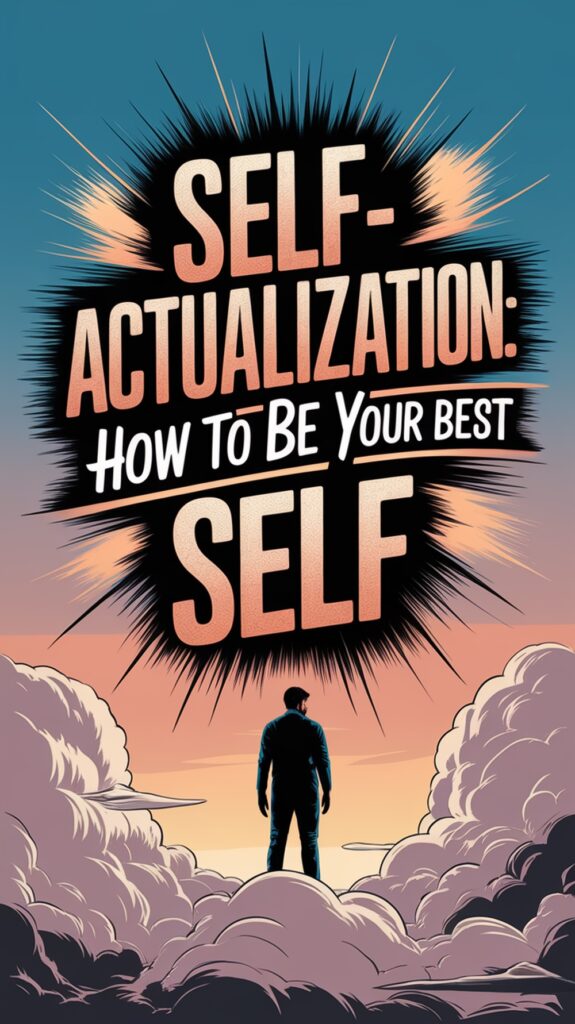In order to become our best selves, we need to achieve self-actualization. It’s learning to appreciate what really makes you, YOU, and practicing that everyday pursuit of the life you want to live.
In this blog post, we’ll outline some practical strategies to help you become self-actualized. That may sound optimistic, but if you believe in yourself, you can do it!
Jump To Section
What Is Self-Actualization?

At its heart, self-actualization is the integration of the “real self” and the “ideal self.” It’s about self-determination, being driven by intrinsic motivation, where growth is pursued for its own sake. As the pinnacle of psychological growth, it’s about bringing together one’s core, talents, and yes, weaknesses.
Key elements include:
- Creativity: Thinking beyond conventional patterns.
- Autonomy: Acting with independence while staying true to oneself.
- Peak experiences: Moments of profound joy and clarity.
Why It Matters in Personal Growth
Self-actualization leads to a greater sense of fulfillment, resilience, and adaptability. By being in touch with your distinct strengths, it fosters a sense of well-being and mental health. Getting there is usually about accepting flaws and making space for the messiness of life.
Historical and Psychological Foundations
Maslow’s hierarchy of needs places self-actualization at the top, above all other human needs. In contrast, Carl Rogers focused on the need to bring one’s self-concept into harmony with reality. For Kurt Goldstein, self-actualization was about living authentically and fully, even at the risk of one’s life.
|
Theorist |
Key Contribution |
|---|---|
|
Abraham Maslow |
Defined self-actualization as fulfilling one’s potential and reaching self-fulfillment. |
|
Carl Rogers |
Focused on actualizing the self-concept through personal growth. |
|
Kurt Goldstein |
Linked self-actualization to realizing one’s essence, even under existential risks. |
Traits of Self-Actualized Individuals

Self-actualized individuals are exemplars of autonomy, guided by internal values over external approval. They exhibit deep acceptance of themselves, acceptance of both their strengths and their vulnerabilities, acceptance of the world around them, realistic, unpredictable, messy.
Their problem-solving skills are rooted in a rational, objective nature, which leads them to favor solutions that benefit the many or all. Intrinsic motivation fuels their work, centered on self-development and purposeful objectives instead of external, aesthetic rewards.
This sense of motivation exists alongside a sense of humility, which in turn makes them more empathetic to others while still having a healthy sense of self-esteem.
They are proud of their unique culture, but still rooted in the community. They’re sometimes at the forefront of the fight for social justice and progressive change. This is emblematic of their ability to overcome opposites, like harmonizing free will with outside forces.
Examples of Self-Actualized People
Real-life heroes such as Mahatma Gandhi, Viktor Frankl, and Nelson Mandela are shining examples of these qualities. Gandhi’s commitment to nonviolence, Frankl’s resilience through unimaginable suffering, and Mandela’s dedication to reconciliation highlight their shared focus on purpose and human dignity.
Their most impressive feats are still educating and civilizing us all, remaining free of ego, conceit, and cruelty.
How These Traits Manifest in Daily Life
Daily life for self-actualized individuals includes meaningful work, creative expression, and experiences that foster lifelong learning. They are the eye of the storm, guiding their teams through turbulence, uncertainty, and change while elevating those around them with acts of service and stewardship.
The Journey Toward Self-Actualization

The journey toward self-actualization is a lifelong process of growing, thriving, and finding meaning. Getting to this place takes a strong base, which means meeting physiological, security, social, and self-esteem needs before self-actualization can occur.
Though the journey is intensely individualistic and different from person to person, I’m going to provide you with some steps you should take to begin your journey.
1. Recognize Your True Potential
Understanding your unique strengths is the first step. Reflect on your innate talents. What comes naturally to you? Then, set aspirations that challenge but don’t overwhelm you.
Realistic yet ambitious goals fuel growth. Self-belief plays a critical role. Believing in your abilities unlocks potential.
To assess your strengths and goals:
- Write down skills you’ve been praised for.
- List activities that energize you.
- Identify areas where growth feels meaningful.
2. Embrace Self-Awareness and Reflection
Self-awareness helps close the distance between the “real self” and the “ideal self.” Introspection tools, whether it’s journaling or meditation or something else, allow you to see patterns of thought and behavior. Depending on what those thoughts are you can choose to change those patterns if it’s negative or reinforce those patterns if it’s positive.
Receiving trusted and undistorted feedback from others can also provide crucial perspective. Others tend to see things in us that we don’t always see ourselves.
3. Set Meaningful Goals
Make sure your mind, body, and actions are on the same page. Align goals with passion and values. Chunk down big goals into achievable, downsized targets.
Flexibility is key. Be willing to adjust as priorities change. These could be things like learning to control your anger, developing a higher emotional intelligence, or cultivating stronger connections with others.
4. Overcome Fear and Limiting Beliefs
Negative thought patterns can be debilitating. Combat fear by slowly exposing yourself to what makes you uncomfortable. Failures, when reframed as lessons rather than setbacks, in turn cultivate resilience and confidence.
The truth is, the best growth exists outside of our comfort zones. You need to get a little uncomfortable to become your best self.
5. Cultivate Resilience and Adaptability
Resilience allows you to recover from inevitable setbacks. Adaptability helps you make progress when the future is uncertain. Engagement in practices such as mindfulness or stress management improves coping abilities, laying the groundwork for long-term self-actualization.
Practical Habits to Foster Self-Actualization

Self-actualization is not a destination, but a continual process of becoming, involving active and creative effort, and deliberate practice of habits. By practicing in accordance with your highest values and aspirations, you create a clear path toward becoming the person you were meant to be.
Here, we explore crucial habits to help develop self-awareness, resilience, and deep fulfillment.
Daily Practices for Growth and Fulfillment
Tiny practices, done regularly, build the biggest impact. Simple practices like gratitude journaling can shift your mindset toward positivity, while daily exercise sustains physical and mental energy.
Reading helps you know more about the world and other people, which helps you develop empathy and understanding. Making self-care a priority, such as fueling your body with nutritious meals and making time to reflect daily, sets you up to have strong mental clarity.
Understand that on a daily basis you will have ebbs and flows, but sticking with it for the long run is crucial. Try to build some of these habits into your daily routine and don’t stop because you’re not seeing immediate results. Trust the process and celebrate each step you take as an accomplishment.
The Role of Mindfulness and Meditation
Mindfulness fosters self-awareness, as being more present helps you connect with your feelings in the moment. Meditation, even just 10 minutes a day, helps you focus better, gain emotional regulation, and develop a stronger connection to yourself.
This practice helps you become familiar with your high and low moments, judgment-free. Great beginner-friendly practices are mindful breathing, body scans, or mindfulness walking and simply noticing the environment around you.
These strategies help you take a step back, reboot, and approach the world with a fresh perspective.
Leveraging Technology for Personal Development
Technology can become powerful allies in our quest for self-actualization with tools that reinforce personal development like habit tracking or goal-setting apps.
Technology-enabled platforms such as massive open online courses (MOOCs) offer a plethora of resources to acquire in-demand skills or just explore your interests.
Communities, like Reddit, offer a level of accountability and motivation. For authenticity and real connection to thrive, we need to make time online and in-person.
Challenges and How to Overcome Them

Self-actualization is an intensely personal process, and each individual needs to work through a range of challenges. It’s anything but a linear process, and the challenges are at times dishearteningly daunting. By knowing these challenges and arming yourself with real-world tactics, you can more easily navigate the rocky road of becoming your best self.
Common Obstacles on the Path
Yet, barriers like procrastination, perfectionism, and fear of failure make it difficult to move forward. Aiming for impossible standards can result in burnout or reluctance to even begin. In the same way, self-doubt and negative self-talk can chip away at confidence.
Beliefs such as “I’m not qualified enough” or “What if I fail?” tend to produce mental hurdles.
Societal expectations are just as important. Cultural norms or external pressures to conform can pull individuals away from their authentic selves, making it harder to embrace their unique path. For clarity, here’s a breakdown:
|
Internal Obstacles |
External Obstacles |
|---|---|
|
Fear of failure |
Societal judgment |
|
Negative self-talk |
Family or peer expectations |
|
Perfectionism |
Workplace demands |
Strategies to Stay Motivated
Recognizing these small victories keeps you engaged and motivated. For instance, did you decide to meditate for 10 minutes today, that’s a win.
Accountability partners or mentors provide guidance and encouragement, while revisiting personal goals maintains clarity. Like I said earlier, others see things you might not and they will hopefully call you out when you start grifting from your path.
Visualization techniques, like picturing yourself crossing finish lines, is another great technique to keep the motivation up. Close your eyes see it, then open them up and become it.
Dealing with External Pressures and Expectations
This is where boundary setting comes in. For example, reducing the amount of time we use to conduct activities that don’t serve our values is crucial.
Building relationships that create a foundation of resilience is also important.
Self-compassion is key in dealing with criticism, as it encourages people to take care of themselves above all else.
The Role of Relationships and Community
Relationships are critical for providing emotional feedback. Whether it’s a friend offering encouragement or a mentor providing constructive critique, these interactions help us understand our strengths and areas for improvement.
Whether it’s working together on a team project or celebrating personal and professional milestones, these shared experiences deepen bonds and foster an environment where everyone can grow. In addition, connections deepen our capacity for empathy, helping us understand other people’s experiences and perspectives, and expanding our emotional intelligence.
To nurture meaningful relationships:
- Listen actively and without judgment.
- Show appreciation and gratitude regularly.
- Invest time in shared activities and traditions.
- Be patient and forgiving of imperfections.
Balancing Independence with Interdependence
As the last stage of development, self-actualization only comes when one balances independence with interdependence. Balancing independence with interdependence allows individuals to maintain their sense of self.
Relationships foster authenticity. Interdependence creates fertile ground for shared learning and mutual support. For instance, an interdependent relationship in which both partners are able to achieve their goals while supporting each other encourages a sense of thriving.
You may be like me where you try to be independent and do everything on your own without relying on others but most things are easier and more effective with others. Now if you are the type of person that tries to have others help with everything, you may need to work on being a little more independent. The key is finding the right balance.
Self-Actualization and Broader Personal Development
Completion of self-actualization is an individual goal, not a societal endpoint. It is profoundly personal and informed by unique strengths, cultural context, and experiences. Its pursuit is inextricably linked to deeper personal growth, building emotional resilience and balance, a sense of purpose and fulfillment.
Links Between Mental Wellness and Self-Actualization
Self-actualization fosters emotional well-being by bringing one’s behavior into harmony with one’s true self, lessening the conflict within. This alignment builds personal and social resilience, allowing people to better weather the unpredictable nature of life.
It alleviates stress through increased self-acceptance and understanding of one’s goals in life and society. The inner peace and mental well-being that comes from having a clear sense of purpose are crucial benefits to all of our lives.
|
Mental Wellness Practice |
Contribution to Self-Actualization |
|---|---|
|
Mindfulness |
Enhances self-awareness and emotional regulation |
|
Goal setting |
Provides clarity and purpose |
|
Gratitude practices |
Fosters contentment and appreciation |
How It Enhances Life Satisfaction
Self-actualization is what closes the gap between our values and our actions, conjuring up peace in our decision-making. It nurtures gratitude, helping to train appreciation for the little wins.
Through this process, self-actualization fosters a feeling of achievement and deepens our interpersonal connections with others using authenticity and empathy.
Long-Term Benefits for Personal Growth
Ultimately, self-actualization fosters resilience, self-efficacy, and an appreciation for lifelong learning. It moves people closer to achieving their dreams and improves moods, psychological strength, and mental health.
This ongoing development brings about long-term well-being and fulfillment.
Conclusion
Self-actualization isn’t a destination. It’s an continuous journey of personal growth, self-reflection, and living in line with your values. It’s about understanding your true potential and making purposeful decisions to be your true self in the midst of a complicated world.
Though challenges are unavoidable, they almost always present opportunities to grow and expand your knowledge of yourself. Relationships and community are important factors as well, underscoring that self-actualization does not happen in a vacuum.
At the end of the day, self-actualization is an extremely personal journey, sculpted by your individual history and future goals. By remaining true to this relentless pursuit, you become self-actualized. You’re helping create a more beautiful world for not just yourself but those around you.

Frequently Asked Questions
What is self-actualization?
Self-actualization is all about getting to know yourself so that you can unlock your full potential and be the best version of yourself. It’s about self-improvement, self-discovery, understanding your potential, and making your life both rewarding and significant.
What are common traits of self-actualized individuals?
Self-actualized individuals are confident, creative, and compassionate. They welcome adversity, appreciate being real, and possess an inner calling. They’re very open-minded and have a zest for life.
How can I start my journey toward self-actualization?
Start with developing concrete and measurable personal objectives, considering what you value, and being committed to self-improvement. Get in the habit of practicing self-awareness and be open to growth opportunities. Whatever it is, taking small, continuous steps gets you closer.
What habits help foster self-actualization?
Practices such as journaling, mindfulness, and self-reflection allow us to develop these skills. Focus on self-improvement, nurture positive connections, and engage in work or hobbies that reflect your true interests and beliefs.
What challenges might I face on this journey?
You might experience self-doubt, fear of failure, or outside pressure to play it safe. These challenges are to be expected, with resilience, self-compassion, and the support of others, they can be navigated.
How do relationships impact self-actualization?
Positive relationships offer love, help, hope, and a sense of purpose. Just as real growth requires a supportive community, impactful work requires a field rooted in trust, collaboration, and shared experience.
Is self-actualization connected to personal development?
By becoming the best version of yourself, you set free what was always hidden within and live a more connected, intentional life. So it’s a living document.







